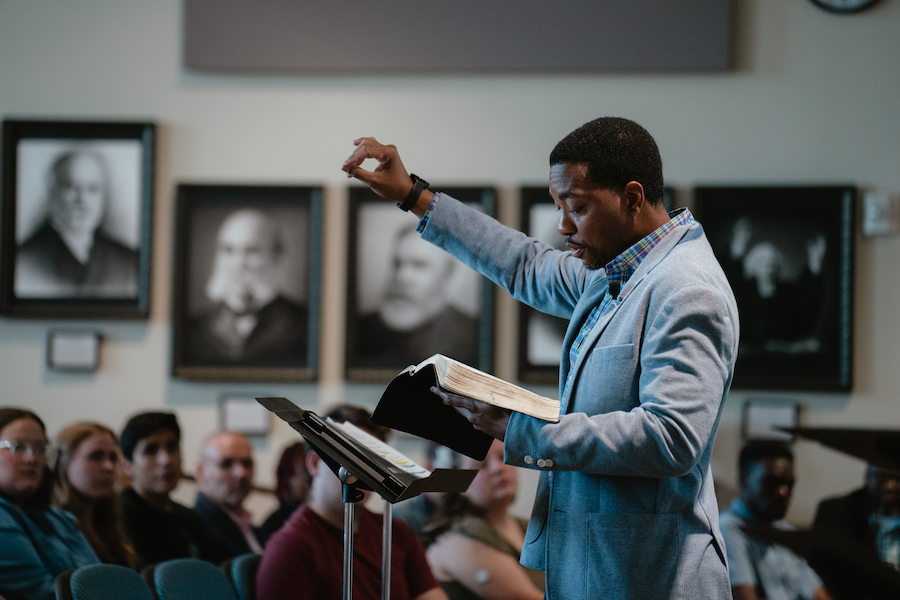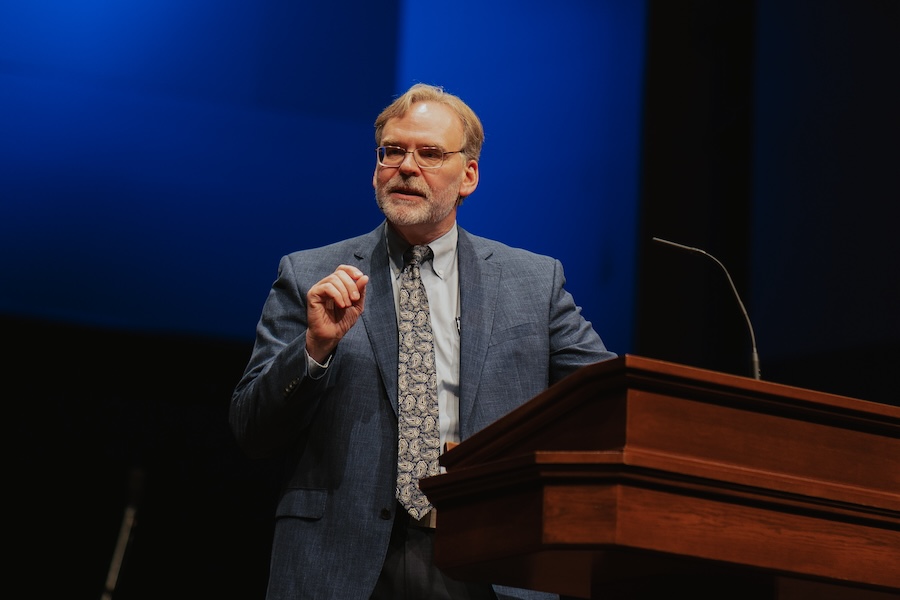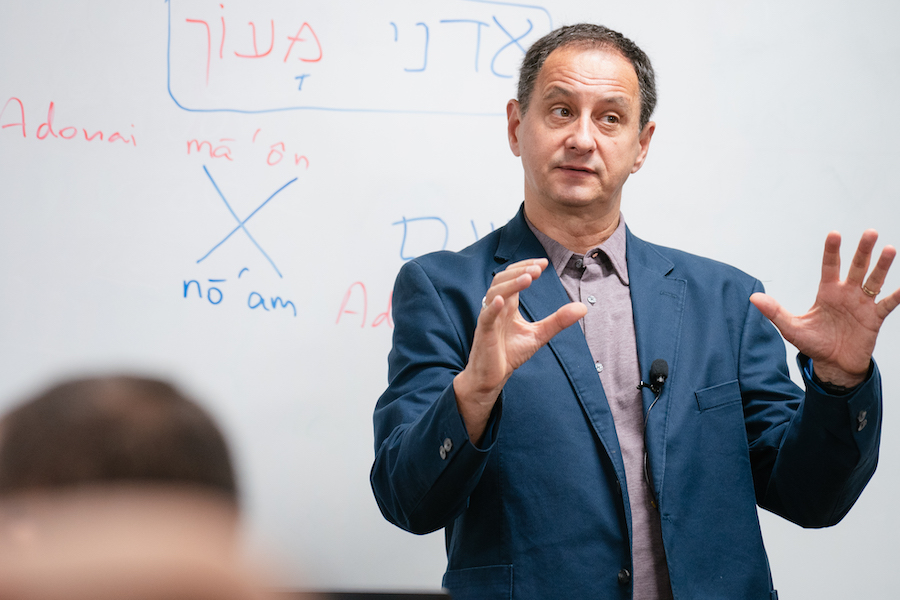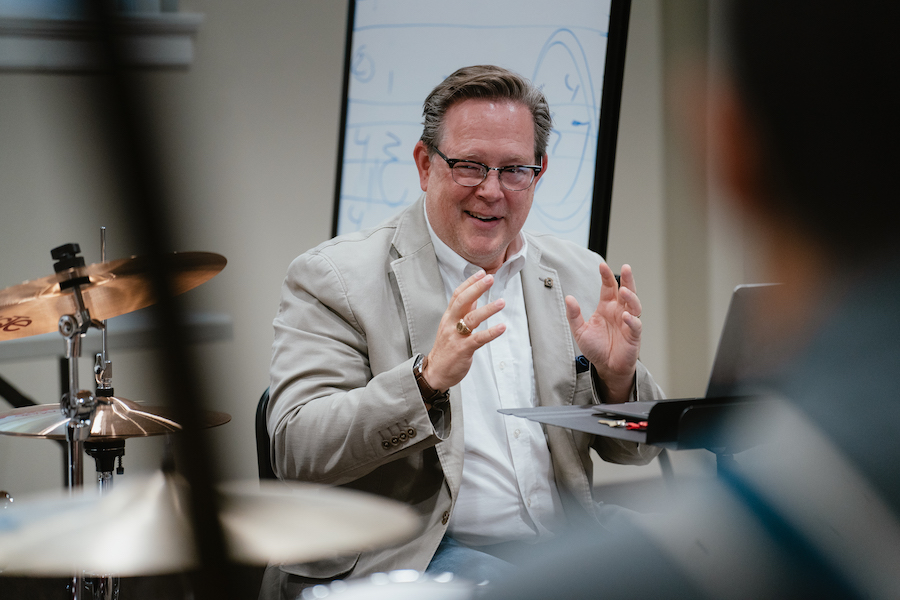In first TBC Chapel as dean, Bradford challenges students to be true disciples of Christ

On Sept. 18, Carl Bradford led his first chapel service as the recently appointed dean of Texas Baptist College. The worship service was filled with students and faculty, some standing on the sides with no place to sit left in Draper Auditorium in Mathena Hall.
The dean began his message with a resonating statement: “We live in a ‘following’ society.”
Bradford said many people choose to follow celebrities or others with shared interests on social media without reflecting on the values held by those influencers and how they can affect a Christ-follower’s walk of faith.
Bradford said many people claim to know Christ, yet their actions and lifestyle don’t reflect said beliefs. He believes this is because the current age is one where everyone is interconnected and has more interest in following celebrities than the Lord. Bradford said true followers of Christ must understand and believe in who the Bible says Jesus is, what He came to do, and what He requires His followers to do.
“The question is, what does it really mean to follow Christ?” Bradford asked. “Or, in other words, what does it mean to be a disciple of Christ today?”
Bradford began by analyzing the way the first disciples had considered that very question, preaching from Mark 8:27-38 in which Jesus asked His disciples plainly, “Who do people say that I am?”
He raised the idea that all religious persons, and even those without religion, have opinions of who Jesus is—a “genie,” an “enlightened man,” a prophet, a “social justice warrior,” a “figure they can identify to get their agenda across.” However, Bradford said that if people listen closely to the Bible, they can—and if they claim to be His disciples, they must—have a clear picture of who Jesus is and how they are to follow Him.
Bradford pointed out other areas of Scripture that describe Jesus as the Son of Man, a “human, heavenly figure,” “Lord of the Sabbath,” and the authority over sin.
Bradford took this a step further, pointing out Jesus’ own elaborations after asking the question, stating that not only must followers of Christ seek to have a clear understanding of who Jesus is, but also understand what He came to do. Bradford pointed out that Jesus went on to tell His disciples that He would suffer and die, but the disciples did not want to accept that, and Peter even tried to talk Him out of fulfilling the Gospel on the cross.
Bradford said although Peter sought to “talk Jesus out of fulfilling the plan of God,” Jesus knew what needed to be done and thus scolded him. The dean took this example and applied it to a Christian’s own interactions with God’s will as a believer.
“Is it possible that a person who follows Christ, who affirms who Christ is, but yet they will tend to dissuade and miss the plan of God? This is possible,” Bradford said. He drew allusions to the Black Lives Matter riots and the storming of the United States Capitol in recent years, stating that those groups each included people who proclaimed Jesus as their Lord, in some cases even praying to Him before their acts of violence, viewing Him as a motivating factor for their own agendas.
“Verbally, they affirm Christ, but yet they missed the plan of Christ,” Bradford said. “Jesus did not come to be your reason that you can have your social justice issue affirmed. He did not come, that you can have your rights affirmed.”
Instead, Bradford said Jesus came to die for sinners so they can be forgiven and become His disciples.
Finally, Bradford gave an anecdote from the mid-19th century of a Christian in India who saw his two sons and wife killed because he refused to denounce his faith in Christ, instead saying, “The cross before me, the world behind me, I have decided to follow Jesus.” As a result of his firm belief, those responsible for his family’s death became believers.
“This man was fully convinced for who Jesus was, what Jesus came to do, and what he required his followers to do,” Bradford said. “This man was, and fully intended to be, a disciple of Christ. What about you and I?”
Concluding his message, Bradford encouraged students to ask themselves if they are following Jesus, saying “let’s be reminded that if we do have questions about being disciples, if we do have questions about whether we’re really saved or not, or what it means to follow Christ, that we know there’s grace that stands available to us.”
Two more TBC chapel services will be held this semester on Oct. 16 and Nov. 6.



